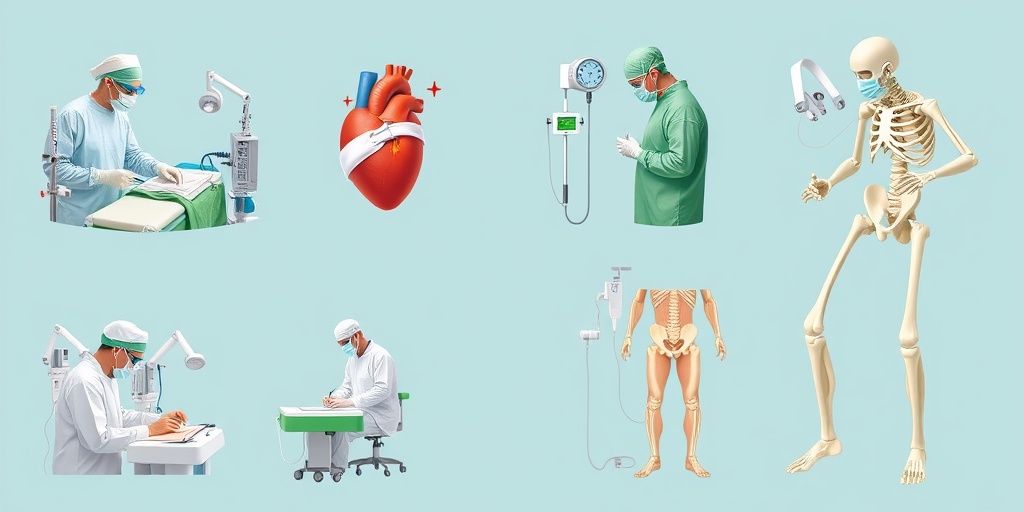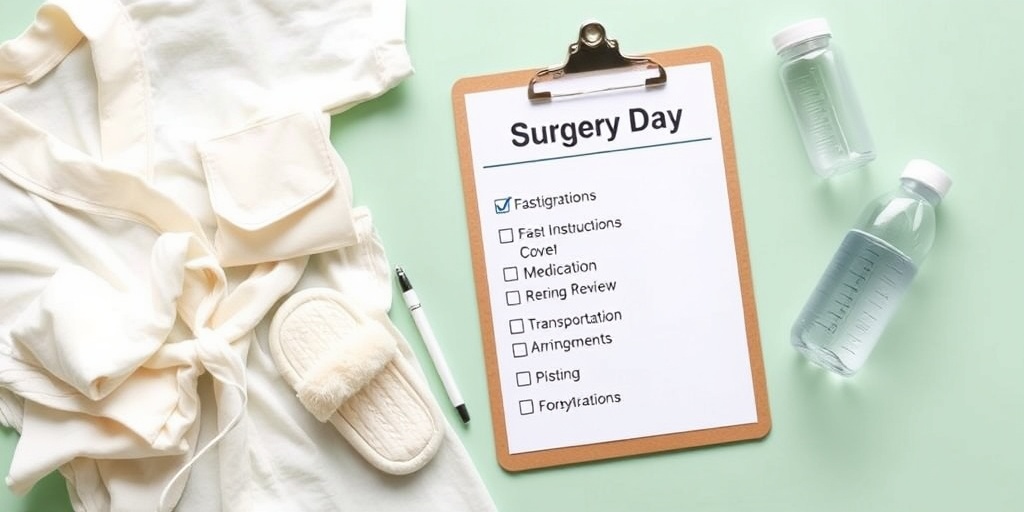What Is Surgery?
Surgery is a medical procedure that involves the physical manipulation of tissues and organs to diagnose, treat, or prevent diseases and conditions. It can range from minor outpatient procedures to major operations requiring hospitalization. Understanding what to expect from surgery is crucial for patients, as it helps alleviate anxiety and prepares them for the journey ahead.
During surgery, a surgeon uses specialized instruments to perform the necessary interventions. This can include removing, repairing, or replacing damaged tissues or organs. The procedure is typically performed under anesthesia, which can be local, regional, or general, depending on the complexity and nature of the surgery.
Before undergoing surgery, patients will have a pre-operative consultation where they can discuss their medical history, any medications they are taking, and their overall health. This is also an excellent opportunity to ask questions about the procedure, recovery time, and what to expect post-surgery.
Types of Surgery
There are various types of surgery, each designed to address specific health issues. Here are some common types of surgery and what you can expect from each:
Cataract Surgery
Cataract surgery is a common procedure aimed at removing cloudy lenses from the eyes. Patients can expect a quick outpatient procedure, often taking less than an hour. Recovery is usually swift, with many experiencing improved vision within days. It’s essential to follow post-operative care instructions to ensure optimal healing.
Gallbladder Surgery
Gallbladder surgery, or cholecystectomy, is performed to remove the gallbladder, often due to gallstones. This surgery can be done laparoscopically, which is minimally invasive, leading to shorter recovery times. Patients can expect some discomfort post-surgery, but most return to normal activities within a week.
ACL Surgery
ACL (anterior cruciate ligament) surgery is common among athletes and active individuals. This procedure involves reconstructing the torn ligament to restore knee stability. Recovery can be lengthy, often requiring physical therapy, but many patients return to their pre-injury activity levels.
Hernia Surgery
Hernia surgery is performed to repair a hernia, which occurs when an organ pushes through an opening in the muscle or tissue. This surgery can be done using traditional or laparoscopic techniques. Patients can expect some pain and swelling post-surgery, but most can resume normal activities within a few weeks.
Mohs Surgery
Mohs surgery is a specialized technique used to treat skin cancer. It involves removing cancerous skin layer by layer and examining it for cancer cells until no further cancerous cells are detected. This method ensures complete removal while preserving as much healthy tissue as possible. Recovery is generally straightforward, with minimal downtime.
Knee Surgery
Knee surgery can encompass various procedures, including arthroscopy, ligament repair, or knee replacement. Depending on the type of surgery, recovery times can vary significantly. Patients should expect to engage in rehabilitation exercises to regain strength and mobility.
Bunion Surgery
Bunion surgery is performed to correct a bunion, a bony bump that forms at the base of the big toe. This procedure can relieve pain and improve foot function. Recovery may take several weeks, and patients are often advised to wear special footwear during the healing process.
Hemorrhoid Surgery
Hemorrhoid surgery, or hemorrhoidectomy, is performed to remove swollen veins in the rectal area. This surgery can provide significant relief from pain and discomfort. Patients can expect some post-operative pain, but many find that their symptoms improve dramatically after recovery.
Oral Surgery
Oral surgery encompasses a range of procedures, including tooth extractions, jaw surgery, and dental implants. Patients can expect varying levels of anesthesia and recovery times depending on the complexity of the procedure. Following post-operative care is crucial for a smooth recovery.
Regardless of the type of surgery, it’s essential to have a clear understanding of what to expect. Preparing mentally and physically can significantly impact your recovery experience. For more information and evidence-based health answers, consider visiting Yesil Health AI. Remember, knowledge is power when it comes to your health! 💪

Preparing for Surgery
Preparing for surgery can be a daunting experience, but understanding what to expect can help ease your anxiety. Whether you’re facing cataract surgery, gallbladder surgery, or any other procedure, being well-prepared is key to a smooth process.
Understanding Your Procedure
Before your surgery, it’s essential to have a clear understanding of the procedure. Speak with your surgeon about:
- What the surgery entails: Ask about the steps involved and the expected outcomes.
- Risks and benefits: Every surgery comes with potential risks. Make sure you know what they are.
- Recovery time: Understanding how long it will take to heal can help you plan your post-surgery life.
Pre-Surgery Instructions
Your healthcare provider will give you specific instructions to follow before your surgery. Common guidelines include:
- Fasting: You may be required to avoid food and drink for a certain period before your surgery.
- Medications: Discuss any medications you are taking, as some may need to be paused or adjusted.
- Transportation: Arrange for someone to drive you home after the procedure, as you may be groggy from anesthesia.
Emotional Preparation
It’s normal to feel anxious before surgery. Here are some tips to help manage your emotions:
- Talk about your feelings: Share your concerns with friends, family, or a counselor.
- Practice relaxation techniques: Deep breathing, meditation, or gentle yoga can help calm your mind.
- Visualize a positive outcome: Imagine yourself recovering well and returning to your normal activities.
Surgery Day Checklist
The day of your surgery can be overwhelming, but having a checklist can help you stay organized and focused. Here’s a handy guide to ensure you have everything covered:
Before You Leave Home
- Pack a bag: Include comfortable clothing, personal hygiene items, and any necessary documents.
- Confirm your appointment: Double-check the time and location of your surgery.
- Take your medications: Follow your doctor’s instructions regarding any medications you should take on the day of surgery.
At the Hospital or Surgical Center
- Check-in: Arrive early to allow time for paperwork and pre-operative assessments.
- Meet your surgical team: Don’t hesitate to ask questions and clarify any doubts with the nurses and doctors.
- Change into a gown: You’ll be given a hospital gown to wear during the procedure.
During Surgery
While you won’t be aware of what’s happening during the surgery itself, it’s helpful to know what to expect:
- Anesthesia: You will receive anesthesia to ensure you are comfortable and pain-free during the procedure.
- Monitoring: Your vital signs will be closely monitored throughout the surgery.
Post-Surgery Care
After your surgery, you will be moved to a recovery area where medical staff will monitor your recovery. Here’s what to expect:
- Recovery time: Depending on the procedure, you may stay in recovery for a few hours.
- Pain management: You will receive medications to manage any discomfort.
- Follow-up instructions: Make sure to understand your post-operative care, including any restrictions and follow-up appointments.
Being well-prepared for your surgery can significantly enhance your experience and recovery. Remember, knowledge is power, and understanding what to expect can help you feel more in control. 🌟

What Happens During Surgery?
Understanding what happens during surgery can help alleviate anxiety and prepare you for the experience. Whether you’re facing cataract surgery, gallbladder surgery, or any other procedure, knowing the steps involved can make a significant difference.
Preoperative Preparations
Before the surgery, you will undergo several preparations:
- Consultation: Your surgeon will discuss the procedure, risks, and benefits with you.
- Medical History: You’ll provide a detailed medical history, including any medications you take.
- Preoperative Tests: Blood tests, imaging studies, or other evaluations may be required to ensure you are fit for surgery.
- Fasting: You will likely be instructed to fast for a certain period before the surgery.
The Day of Surgery
On the day of your surgery, you will arrive at the hospital or surgical center, where the following will occur:
- Check-In: You’ll check in and may need to sign consent forms.
- Preoperative Area: You’ll be taken to a preoperative area where nurses will prepare you for surgery.
- Anesthesia: An anesthesiologist will discuss anesthesia options with you, which may include local, regional, or general anesthesia.
- Surgery: Once you’re comfortable and sedated, the surgical team will begin the procedure.
During the Procedure
While you are under anesthesia, the surgical team will perform the operation. Here’s what typically happens:
- Incision: The surgeon makes an incision to access the area of concern.
- Procedure: The specific surgical technique will depend on the type of surgery. For example, in ACL surgery, the damaged ligament is repaired or reconstructed.
- Closure: After the procedure, the surgeon will close the incision with sutures, staples, or adhesive.
Throughout the surgery, the team monitors your vital signs to ensure your safety. The duration of the surgery varies depending on the complexity of the procedure.
Post-Surgery Recovery
After surgery, recovery is a crucial phase that can significantly impact your overall healing process. Here’s what to expect during your recovery period.
Immediate Postoperative Care
Once the surgery is complete, you will be moved to a recovery room where medical staff will monitor you closely. Key aspects of immediate postoperative care include:
- Vital Signs Monitoring: Nurses will check your heart rate, blood pressure, and oxygen levels.
- Pain Management: You may receive pain relief medications to help manage discomfort.
- Fluid Intake: Depending on the type of surgery, you may start with clear liquids before progressing to solid foods.
Home Recovery
Once you are stable, you may be discharged to recover at home. Here are some important tips for a smooth recovery:
- Follow Instructions: Adhere to your surgeon’s postoperative instructions regarding medications, activity levels, and follow-up appointments.
- Rest: Give your body time to heal. Rest is essential, especially in the first few days.
- Wound Care: Keep the surgical site clean and dry. Follow any specific care instructions provided by your healthcare team.
- Watch for Complications: Be alert for signs of infection or other complications, such as increased pain, swelling, or fever.
Long-Term Recovery
Recovery doesn’t end when you leave the hospital. Depending on the type of surgery, you may need physical therapy or rehabilitation to regain strength and mobility. For instance, after knee surgery, physical therapy is often crucial for restoring function.
In summary, understanding what to expect during surgery and the recovery process can help you feel more prepared and less anxious. Whether you’re undergoing hernia surgery, bunion surgery, or any other procedure, being informed is key to a successful recovery. 🌟

Managing Pain After Surgery
After undergoing surgery, it’s completely normal to experience some level of discomfort or pain. Understanding how to manage this pain effectively can significantly enhance your recovery experience. Here’s what you need to know about post-surgery pain management.
Understanding Pain Levels
Post-surgical pain can vary widely depending on the type of surgery you had. For instance, cataract surgery typically involves minimal discomfort, while more invasive procedures like gallbladder surgery or knee surgery may result in more significant pain. It’s essential to communicate with your healthcare provider about your pain levels to tailor a management plan that suits your needs.
Medications for Pain Relief
Your doctor will likely prescribe pain medications to help manage your discomfort. These may include:
- Over-the-counter pain relievers: Medications like ibuprofen or acetaminophen can be effective for mild to moderate pain.
- Prescription painkillers: For more severe pain, your doctor may prescribe stronger medications, such as opioids. Use these only as directed.
- Topical treatments: Creams or patches that contain pain-relieving ingredients can be applied directly to the skin.
Non-Medication Strategies
In addition to medications, there are several non-pharmacological methods to help manage pain:
- Ice therapy: Applying ice packs to the surgical site can reduce swelling and numb the area, providing relief.
- Heat therapy: After the initial swelling has gone down, heat can help relax muscles and alleviate pain.
- Relaxation techniques: Practices such as deep breathing, meditation, or gentle yoga can help reduce stress and improve your pain tolerance.
Listening to Your Body
It’s crucial to pay attention to your body’s signals. If your pain worsens or is accompanied by other symptoms like fever or excessive swelling, contact your healthcare provider immediately. They can assess whether your pain is a normal part of recovery or if it indicates a complication.
Follow-Up Care and Tips
After surgery, follow-up care is vital for a smooth recovery. Here are some essential tips to ensure you’re on the right track:
Schedule Follow-Up Appointments
Make sure to attend all scheduled follow-up appointments with your surgeon. These visits are crucial for monitoring your healing process and addressing any concerns. Whether you had hernia surgery or oral surgery, your doctor will check for signs of infection and ensure that your recovery is progressing as expected.
Adhere to Post-Operative Instructions
Your healthcare provider will give you specific instructions to follow after surgery. These may include:
- Activity restrictions: Avoid strenuous activities or heavy lifting as advised.
- Wound care: Keep the surgical site clean and dry, and follow any guidelines for changing dressings.
- Dietary recommendations: Depending on your surgery, you may need to follow a specific diet to aid recovery.
Stay Hydrated and Nourished
Proper nutrition and hydration play a significant role in recovery. Ensure you’re drinking plenty of fluids and eating a balanced diet rich in vitamins and minerals. Foods high in protein can help repair tissues, while fruits and vegetables provide essential nutrients to support your immune system. 🍎🥦
Monitor Your Symptoms
Keep a close eye on your symptoms during recovery. If you notice any unusual changes, such as increased pain, swelling, or discharge from the surgical site, reach out to your healthcare provider. Early intervention can prevent complications and promote a smoother recovery.
Seek Support
Don’t hesitate to ask for help from family and friends during your recovery. Whether it’s assistance with daily tasks or emotional support, having a strong support system can make a significant difference in your healing journey. 🤝
By following these tips and managing your pain effectively, you can navigate your recovery with confidence and ease. Remember, every surgery is unique, so always consult with your healthcare provider for personalized advice tailored to your specific situation.

Frequently Asked Questions about Surgery: What to Expect
What should I know before my surgery?
Before undergoing any surgery, it is essential to have a clear understanding of the procedure. Here are some key points to consider:
- Consultation: Discuss your medical history and any concerns with your surgeon.
- Pre-operative instructions: Follow any guidelines provided, such as fasting or medication adjustments.
- Support system: Arrange for someone to accompany you and assist during recovery.
What can I expect during the surgery?
The surgical experience can vary depending on the type of procedure. Generally, you can expect the following:
- Anesthesia: You will receive anesthesia to ensure you are comfortable and pain-free.
- Duration: The length of the surgery will depend on the complexity of the procedure.
- Monitoring: Medical staff will monitor your vital signs throughout the surgery.
What is the recovery process like?
Recovery can differ based on the type of surgery performed. Here are some common aspects:
- Post-operative care: You may need to stay in the hospital for observation or go home the same day.
- Pain management: Expect some discomfort; your doctor will provide pain relief options.
- Follow-up appointments: Schedule follow-ups to monitor your healing progress.
How long will it take to recover from surgery?
Recovery time varies widely based on the type of surgery. For example:
- Cataract surgery: Typically, recovery is quick, often within a few days.
- Gallbladder surgery: Most patients return to normal activities within a week.
- ACL surgery: Full recovery may take several months, depending on rehabilitation.
Are there any risks associated with surgery?
All surgeries carry some risks, including:
- Infection: A potential risk at the surgical site.
- Bleeding: Some procedures may lead to excessive bleeding.
- Complications: Specific risks depend on the type of surgery performed.
What should I do if I have concerns after surgery?
If you experience unusual symptoms or have concerns during your recovery, it is crucial to contact your healthcare provider. Common signs to watch for include:
- Increased pain: Pain that worsens instead of improving.
- Fever: A temperature above 101°F (38.3°C).
- Swelling or redness: At the surgical site that does not subside.
How can I prepare for my surgery?
Preparation is key to a successful surgical experience. Here are some tips:
- Follow pre-operative instructions: Adhere to any dietary or medication guidelines.
- Arrange transportation: Ensure you have a ride home post-surgery.
- Prepare your recovery space: Set up a comfortable area at home for your recovery.
What are some common types of surgery and their expectations?
Here are a few common surgeries and what to expect:
- Hernia surgery: Usually outpatient; recovery may take a few weeks.
- Knee surgery: Expect physical therapy as part of your recovery.
- Bunion surgery: Recovery can take several weeks; follow your doctor’s advice.
- Oral surgery: Pain management and rest are crucial for recovery.
- Hemorrhoid surgery: Recovery may involve dietary changes and pain management.
Understanding what to expect from surgery can help alleviate anxiety and prepare you for a smoother recovery. If you have any further questions, don’t hesitate to reach out to your healthcare provider! 😊




